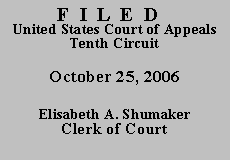

| GONZALO GOMEZ OLIVAS,
Petitioner - Appellant,
v.
STATE OF COLORADO Respondents - Appellees. |
|
Gonzalo Gomez Olivas, a federal prisoner appearing pro se, seeks a certificate of appealability ("COA") in order to challenge the District Court's denial of his 28 U.S.C. § 2254 habeas petition. Our jurisdiction arises under 28 U.S.C. § 2253(c)(1), and because Mr. Olivas has failed to make "a substantial showing of the denial of a constitutional right," 28 U.S.C. § 2253(c)(2), we DENY a COA and DISMISS his appeal. I. BACKGROUND
Mr. Olivas is currently a federal prisoner in the custody of the United States Bureau of Prisons. In 1990 and 1992, prior to his federal conviction, Mr. Olivas pleaded guilty to three separate state crimes in the Larimer County District Court in Colorado. Mr. Olivas completed his sentences in all three cases. Thereafter, Mr. Olivas was convicted of conspiracy to possess with intent to distribute and distribution of cocaine and marijuana in violation of 21 U.S.C. §§ 841(a)(1), (b)(1)(A) and 846. He was subsequently sentenced to 30 years' imprisonment based, in part, on his prior state convictions.
Mr. Olivas filed a petition for habeas corpus in the United States District Court for the District of Colorado under 28 U.S.C. § 2254, challenging the constitutionality of the three prior Colorado state court convictions that were used to enhance his current federal sentence. Mr. Olivas argued that the state court entered each of his guilty pleas in violation of his due process rights. The District Court denied the petition and Mr. Olivas's subsequent request for a COA. Mr. Olivas now seeks a COA from this Court to challenge the District Court's denial of his habeas petition.
II. DISCUSSION
The District Court properly held that Mr. Olivas may not use § 2254 to collaterally attack his expired state convictions. A prisoner may apply for habeas relief under § 2254 only when the habeas applicant is in custody "pursuant to the judgment of a State court." 28 U.S.C. § 2254(a). Although a prisoner serving a sentence enhanced by prior state convictions is "in custody" for purposes of § 2254, once a state conviction is no longer open to direct or collateral attack in its own right, a prisoner may challenge the state conviction under § 2254 in only two narrow circumstances: (1) when there was a failure to appoint counsel in the prior conviction or (2) in the "rare case" where the defendant cannot be faulted for failing to obtain timely review. See Lackawanna County Dist. Attorney v. Coss, 532 U.S. 394, 40305 (2001).
Mr. Olivas does not allege facts that satisfy either exception. He does not suggest that the state courts denied him his Sixth Amendment right to counsel. Nor does he suggest that he was faultless for failing to obtain timely review of his claims. That exception applies in the rare instance that, for example, the state court refuses, without justification, to rule on a properly presented constitutional claim or when the habeas applicant obtains evidence of actual innocence after the time for direct or collateral review has expired. See id. at 405. Though Mr. Olivas contends that the Larimer County District Court failed to rule on his petition for a writ of habeas corpus, the record reveals that he did not file that petition until March 2005. Mr. Olivas's only suggestion as to why he failed to file a timely petition is that he only "recently discovered" the alleged constitutional deficiencies. This is not sufficient to satisfy the Lakawanna exception. See Davis v. Roberts, 425 F.3d 830, 836 (10th Cir. 2005) ("[I]gnorance of the law, even for an incarcerated pro se petitioner, generally does not excuse prompt filing." (quotation omitted)). Finally, Mr. Olivas does not proffer evidence of actual innocence. Accordingly, the District Court properly dismissed the § 2254 claim.
Mr. Olivas also requests to proceed in forma pauperis pursuant to 28 U.S.C. § 1915. We deny this request for the same reasons stated by the District Court.
III. CONCLUSION
We have carefully reviewed Mr. Olivas's claims and the record. For the foregoing reasons, we DENY his application for a COA, DENY his application to proceed in forma pauperis, and DISMISS his appeal.
ENTERED FOR THE COURT,
Deanell Reece Tacha
Chief Circuit Judge
*.This order is not binding precedent, except under the doctrines of law of the case, res judicata, and collateral estoppel. This court generally disfavors the citation of orders and judgments; nevertheless, an order and judgment may be cited under the terms and conditions of 10th Cir. R. 36.3.